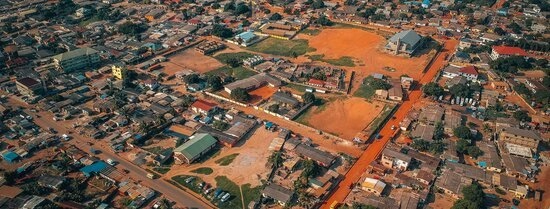FACTSHEET
Themes | Capacity Building; Environmental and Social Impact Assessments; Social Accountability and Public Participatory planning |
Client | Agence Française de Développement (AFD) |
Counterpart Organisation | Ghanaian Ministry of Local Government and Rural Development |
Duration | 2012 - Present |
Countries | Ghana |
IHS Contact |
65% of Ghana’s population is expected to be living in urban areas by 2030, which will be a 13.5% increase in just twenty years. Such rapid, urban growth puts pressure on infrastructure and services such as housing, whilst compounding undesirable effects such as pollution, waste, proliferation of informal neighbourhoods and urban poverty.
The Ghana Urban Management Pilot Programme (GUMPP) is a major six year project supporting Ghana’s Ministry of Local Government and Rural Development (MLGRD) and the four selected cities of Kumasi, Sekondi-Takoradi, Tamale and Ho. The project will finance their priority investments projects, improve living conditions in urban areas and support their capacity building. The programme is financed by the French Development Agency.
GUMPP is composed of programmes for urban infrastructure development, maintenance and district capacity building tailored to each of the four cities. The project will support urban development programmes that:
- Give widespread access to essential services;
- Build the financial, management and ownership capacities of cities;
- Support economic activities and local employment;
- Limit the negative impact of urban extension on peripheral ecosystems.
Whereas GUMPP targets four of Ghana’s 46 Metropolitan and Municipal District Assemblies, one of the key objectives of the project is to identify and test approaches and systems that can be successfully replicated and scaled up to Ghana’s other urban local governments.
IHS’ Role
For the past six years, IHS have provided GUMPP with technical assistance to support its implementation throughout the whole work cycle. This support has been provided to the central government itself, in addition to its Urban Development Unit and the four participating cities. Responsibilities have included:
- Revising the GUMPP 5year work plan and GUMPP Manual of Procedures during the work cycle;
- Establishing the financial and institutional setups of the Programme in addition to the monitoring and reporting systems and facilitating their implementation;
- Developing and implementing a dissemination strategy for the lessons learned to inform the National Urban Policy;
- Progressing capacity building for local management and urban development.
- Supervising and monitoring the infrastructure projects and institutional and financial support activities;
To learn more about GUMPP please contact Mr. Aloysius Bongwa
